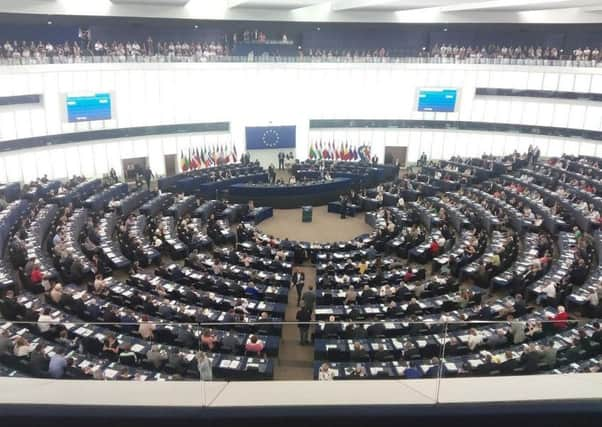Bill Carmichael: EU's insecurities on display at '˜vanity' museum


Condemned by some as a EU “vanity project”, the museum is proud to boast it is “free” to visit. That’s true in that visitors do not have to pay an entry fee.
But as I have pointed out more than once in this column, there is no such thing as “free” anything – someone, somewhere has to pay for it.
Advertisement
Hide AdAdvertisement
Hide AdIn this case that someone is you – the ordinary taxpayers of Europe, who have funded the £48m establishment costs plus what I should imagine are substantial running costs.
Instead of conventional displays with explanatory text, you are given a tablet computer and earpiece at the beginning of the tour and this activates the displays as you walk around.
It tells the story of Europe from ancient times, through political and industrial revolutions and two world wars.
From the ashes of the Second World War, we witness the start of an ideal to unify Europe in peace and prosperity and to end the wars that had killed millions and destroyed the livelihoods of countless millions more.
Advertisement
Hide AdAdvertisement
Hide AdThere is even a small mention of Brexit with some campaign materials from the Leave and Remain sides.
Towards the end we see the Nobel Peace Prize, awarded to the EU in 2012, proudly on display.
The message is clear – the peace we enjoy today is down to the EU.
This is, of course, partly true, but it is interesting in what it misses out. It is undoubtedly correct that the founders of what we now call the EU, such as Robert Schuman and Jean Monnet, were motivated above all by the desire to avoid the conflicts that had devastated the continent twice in less than 40 years. They would no doubt be proud of their achievement today.
Advertisement
Hide AdAdvertisement
Hide AdBut there is little mention in the museum of Nato and the vast contribution made by US taxpayers to the reconstruction and stability of Europe since 1945 – a contribution that continues to this day.
The reason Soviet tanks did not roll westward had more to do with American military might than the high ideals of Monnet and Schuman.
One of the most joyous exhibitions covers the 1989 revolutions and the fall of the Berlin Wall, and we see videos of people across eastern Europe celebrating the end of socialist oppression.
But, of course, the defeat of communism was almost entirely down to Nato and had little to do with the EU.
Advertisement
Hide AdAdvertisement
Hide AdThe museum speaks volumes about the doubt and insecurity that lies at the heart of the European project. A self-confident and secure institution would not feel the need to spend vast sums to tell everyone how brilliant it is.
Above all it is clear evidence that the EU has failed to foster much in the way of emotional engagement from its 500 million citizens, despite all the trappings of nationhood such as a flag, an anthem and expensive museums (there’s another one just around the corner called the Parlamentarium).
People still tend to see themselves primarily as Belgians, Lithuanians or Hungarians and the EU as an artificial identity imposed from above.
And whenever ordinary people are given the opportunity in referenda to give their views of the EU they tend to vote against it – in Denmark, Ireland, France, the Netherlands and, of course, in the UK.
Advertisement
Hide AdAdvertisement
Hide AdAs for Brussels, I found it a much-diminished city following the terror attacks last year, which killed 32 people.
Security is much enhanced, with armed soldiers on almost every street corner and steel and concrete blocks outside many EU buildings.
On the outskirts of the city lies the district of Molenbeek, which has become known as the jihadi capital of Europe. The terror cells responsible for the Paris and Brussels attacks were based there.
Despite pockets of prosperity, the country did not strike me as a happy nation comfortable in its own skin. The economy remains sluggish and the unemployment rate is almost twice as high as the UK’s.
And, despite its many achievements, the EU has so far failed to find any convincing answer to the challenges posed by debt, the lack of growth, migration and terror.